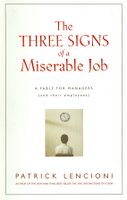Buying this book won't solve your debt issues

Reviewed: “Debt is Slavery: and 9 Other Things I Wish My Dad Had Taught Me About Money,” by Michael Mihalik, October Mist Publishing, 2007, $14.95, 128 pages.
Michael Mihalik was inspired to write this little book because of his own struggles with debt after college.
Mihalik, an aerospace engineer when not penning books, proudly mentions several times throughout “Debt is Slavery” that he has overcome his early credit card debt and is so financially savvy now he was able to take six whole weeks off in order to write his book. Six whole weeks.
This is where I think to myself that I or pretty much anyone who can put pen to paper might be able to come up with 128 pages on any topic if given a month and a half.
When it comes down to it, I don’t think Mihalik’s experience overcoming his debt is anything remarkable. He overextended himself with credit cards while in college and it took a while for him to bail himself out. Well done, Mr. Mihalik, but I also learned that “easy credit” lesson the hard way. So did a few others I know.
While sound, Mihalik’s pointers to overcome your debt are far too general, to the tune of: Don’t buy things you don’t need. Um, OK.
“I came up with 10 basic ideas and rules about money that allowed me to gain control of my finances and pay off my debt,” Mihalik states. “They literally transformed my life.”
Mihalik was 13 when his father died, and the premise of the book is that Mihalik had to come up with his own rules for money because his dad never had the chance to teach him.
“That’s not the easiest way to learn. I wish someone had just taught me the rules, but fate had other plans for me,” he writes. “If you’re drowning in debt, if it seems like you’ll never get ahead financially, or if you’re forced to work at a job you dislike to pay the bills, this book has something for you.”
Something, yes. Something in the way of very general advice.
(Specific financial advice, let it be noted, should come from a financial services professional).
The author says that when he got out of college, armed with his engineering degree and several pre-approved credit cards, he soon found himself in roughly $20,000 of debt and living beyond his means. At the time, Mihalik said he searched for a self-help book but could find none that were short and to the point. There, his idea for this book was born.
“After I eliminated my debt and gained control of my finances, I wanted to help other people do the same, so I decided to write the book I wish had been available to me,” he writes.
It took Mihalik one “hellish year” to get out of debt, he says.
The core lessons of the book are sound: Debt is bad. Try not to get into it. Possessions won’t bring you happiness, so stop buying them. Find work you enjoy, and you’ll be happier. Don’t just save, invest in “income-producing assets.” Spend less than you earn.
Are these suggestions bad advice? Not at all. Did I need to read this book to learn them? Not at all.
The one piece of advice that piqued my interest was the chapter — I mean the three whole pages — on how to save 50 percent of your salary.
“If you save 50 percent of your salary, for every month you work, you will save enough to take a month off — without changing your lifestyle,” Mihalik writes.
Hmmm. Saving half my salary. I don’t think that’s even possible.
But Mihalik anticipates this reaction, and advises trying for a 33 or 25 percent total savings — over and above the maximum 401k plan contributions you can make at work, that is.
To save this quarter of your salary, you have to make a budget, he says.
I agree — making a budget is a great idea for anyone who has any debt at all. It helps you see where your money goes.
Additionally, Mihalik advises, you should budget for savings, trips and special purchases. Yes, all good ideas, but still super-simplified and general.
My advice is to save the money you would spend on this book and add it to your savings.
Michael Mihalik was inspired to write this little book because of his own struggles with debt after college.
Mihalik, an aerospace engineer when not penning books, proudly mentions several times throughout “Debt is Slavery” that he has overcome his early credit card debt and is so financially savvy now he was able to take six whole weeks off in order to write his book. Six whole weeks.
This is where I think to myself that I or pretty much anyone who can put pen to paper might be able to come up with 128 pages on any topic if given a month and a half.
When it comes down to it, I don’t think Mihalik’s experience overcoming his debt is anything remarkable. He overextended himself with credit cards while in college and it took a while for him to bail himself out. Well done, Mr. Mihalik, but I also learned that “easy credit” lesson the hard way. So did a few others I know.
While sound, Mihalik’s pointers to overcome your debt are far too general, to the tune of: Don’t buy things you don’t need. Um, OK.
“I came up with 10 basic ideas and rules about money that allowed me to gain control of my finances and pay off my debt,” Mihalik states. “They literally transformed my life.”
Mihalik was 13 when his father died, and the premise of the book is that Mihalik had to come up with his own rules for money because his dad never had the chance to teach him.
“That’s not the easiest way to learn. I wish someone had just taught me the rules, but fate had other plans for me,” he writes. “If you’re drowning in debt, if it seems like you’ll never get ahead financially, or if you’re forced to work at a job you dislike to pay the bills, this book has something for you.”
Something, yes. Something in the way of very general advice.
(Specific financial advice, let it be noted, should come from a financial services professional).
The author says that when he got out of college, armed with his engineering degree and several pre-approved credit cards, he soon found himself in roughly $20,000 of debt and living beyond his means. At the time, Mihalik said he searched for a self-help book but could find none that were short and to the point. There, his idea for this book was born.
“After I eliminated my debt and gained control of my finances, I wanted to help other people do the same, so I decided to write the book I wish had been available to me,” he writes.
It took Mihalik one “hellish year” to get out of debt, he says.
The core lessons of the book are sound: Debt is bad. Try not to get into it. Possessions won’t bring you happiness, so stop buying them. Find work you enjoy, and you’ll be happier. Don’t just save, invest in “income-producing assets.” Spend less than you earn.
Are these suggestions bad advice? Not at all. Did I need to read this book to learn them? Not at all.
The one piece of advice that piqued my interest was the chapter — I mean the three whole pages — on how to save 50 percent of your salary.
“If you save 50 percent of your salary, for every month you work, you will save enough to take a month off — without changing your lifestyle,” Mihalik writes.
Hmmm. Saving half my salary. I don’t think that’s even possible.
But Mihalik anticipates this reaction, and advises trying for a 33 or 25 percent total savings — over and above the maximum 401k plan contributions you can make at work, that is.
To save this quarter of your salary, you have to make a budget, he says.
I agree — making a budget is a great idea for anyone who has any debt at all. It helps you see where your money goes.
Additionally, Mihalik advises, you should budget for savings, trips and special purchases. Yes, all good ideas, but still super-simplified and general.
My advice is to save the money you would spend on this book and add it to your savings.
Labels: Balancing the Books, business, debt, Debt is Slavery, Michelle Karas, Pottstown, The Mercury
 RSS
RSS



